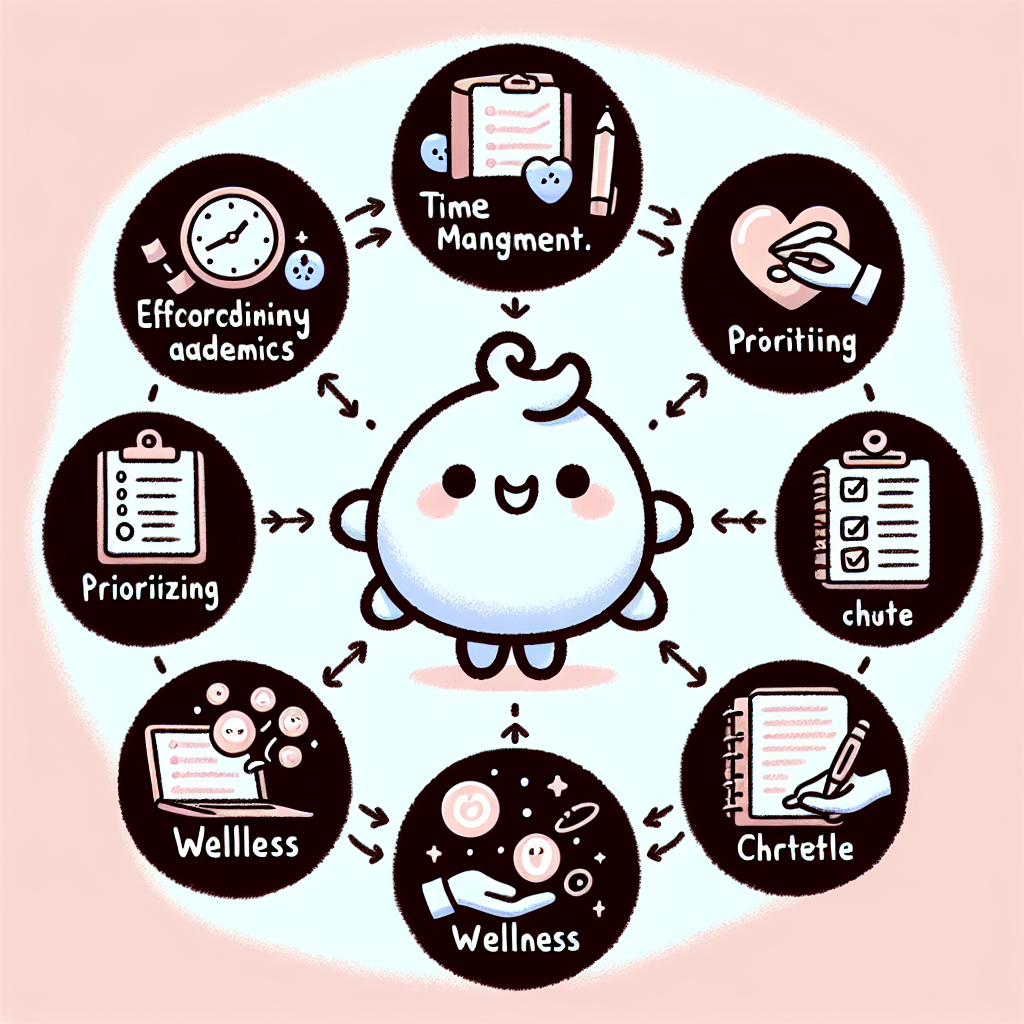Why Time Management Matters for Students
Academic Performance
Time management for students plays a critical role in academic success. By planning ahead and organizing their schedules, students are more likely to meet deadlines and stay on top of assignments. Effective time allocation also allows for regular study sessions, reducing the need for last-minute cramming and helping to lower test-related anxiety.
Personal Well-Being
Good time management reduces stress and helps prevent burnout among students. When students allocate time wisely, they can balance academic responsibilities with personal needs, including rest, self-care, and extracurricular activities. This balance supports mental health and overall well-being.
Long-Term Success
Developing time management skills as a student lays the foundation for future professional success. These habits encourage responsibility, self-discipline, and the ability to prioritize tasks—skills that are essential in both academic and workplace settings.
Citation: University of New Hampshire

🧠 Understanding the Causes of Poor Time Management
Effective time management for students starts with identifying what gets in the way. Several internal and external factors can contribute to poor time use, making academic success harder to achieve.
Procrastination Triggers
Procrastination is a common barrier to time management for students. One major cause is fear of failure or perfectionism—students may delay starting tasks because they fear not meeting high standards. Another trigger is a lack of motivation or interest in the subject matter, which can make it hard to begin or complete assignments. Additionally, students often feel overwhelmed when faced with unclear goals or too many obligations, leading them to avoid tasks altogether instead of tackling them step by step.
External Distractions
Outside factors also play a significant role in disrupting time management for students. Digital distractions like social media, notifications, and constant connectivity can quickly derail focus. Inadequate study environments, such as noisy homes or public places without structure, make it difficult to concentrate and stay on track Texas A&M University.
By recognizing these internal and external challenges, students can begin to take practical steps toward better time management.

🛠️ Essential Tools for Effective Time Management
Effective time management for students relies heavily on using the right tools to stay organized, prioritize tasks, and maintain a consistent study routine. Several resources can make a significant difference in helping students stay on track.
Planners and Calendars
Using fillable calendars in daily, weekly, and monthly formats helps students visualize their schedule and manage commitments such as classes, extracurricular activities, and deadlines. A semester-at-a-glance calendar allows for long-term planning of assignments and exams, reducing last-minute stress and improving preparedness (University of Southern Maine).
Prioritization Frameworks
The Eisenhower Matrix is a useful tool for students to distinguish between urgent and important tasks. By categorizing tasks into four quadrants—urgent and important, important but not urgent, urgent but not important, and neither—students can prioritize more effectively and focus on what truly matters.
Study Schedules
Creating weekly study plans helps students allocate specific time blocks for reading, reviewing material, and completing assignments. This structure promotes consistency and better time allocation. Additionally, using time tracking logs can reveal how time is actually being spent, allowing students to identify distractions or inefficiencies and make informed adjustments (University of New Hampshire).

🔍 Practical Time Management Strategies
Set SMART Goals
Effective time management for students starts with setting SMART goals—Specific, Measurable, Achievable, Relevant, and Time-bound. These goals help students focus their efforts and provide a clear framework for tracking progress. Instead of vague ambitions like "study more," SMART goals offer structure, such as "study biology for 30 minutes every weekday."
The 24-Hour Review Rule
Students can enhance retention and understanding by reviewing class notes within 24 hours of a lecture. This practice reinforces learning and helps identify areas of confusion early on. According to Eastern Kentucky University, prompt review solidifies memory and supports long-term academic success.
Active Study Techniques
Replacing passive review with active study methods improves engagement and comprehension. Strategies like summarizing material in your own words, teaching concepts to a peer, or using flashcards encourage deeper processing and better recall—key elements of effective time management for students.
Break Tasks Into Manageable Chunks
Large assignments can be overwhelming. Breaking tasks into smaller, manageable parts makes them more approachable and reduces procrastination. Techniques like the Pomodoro Technique, which schedules focused 25-minute work sessions with short breaks, or time-blocking specific hours for tasks, help maintain concentration and efficiency.
Create Routines
A consistent daily routine reduces decision fatigue and builds positive study habits. Allocating set times for classes, studying, meals, and rest can create a structured environment conducive to productivity. As Fairmont State University notes, predictable routines help students stay organized and manage their time more effectively.
Learn to Say No
Time management for students often requires making tough choices. Saying no to additional commitments protects valuable study time and prevents burnout. By recognizing personal limits and prioritizing academic responsibilities, students can maintain balance and achieve their goals.

⚖️ Balancing Academics, Work, and Life
Effective time management for students involves more than just organizing study sessions—it requires a balanced approach to academics, work responsibilities, and personal well-being.
Time Mapping
Start by mapping out all fixed commitments such as class schedules, work shifts, and meals. This helps create a realistic overview of your week and makes it easier to identify open blocks of time that can be used for studying or completing assignments. Clearly visualizing your time commitments can prevent over-scheduling and ensure that key academic tasks are not overlooked.
Prioritize Wellness
Maintaining mental and physical health is essential for long-term success. Students should intentionally schedule time for wellness activities such as regular exercise, adequate sleep, and social interactions. These activities reduce stress and increase focus, making academic and work efforts more effective. According to Texas A&M University, incorporating wellness into your schedule is a key aspect of successful time management.
Integrate Flex Time
Unexpected tasks or changes in priorities are inevitable. Incorporating flex time into your weekly schedule allows you to adjust without falling behind. This buffer helps manage last-minute assignments or unplanned events, reducing stress and promoting adaptability.
By combining time mapping, wellness prioritization, and flexible scheduling, students can better manage their academic, work, and personal responsibilities.

📈 Monitoring and Adjusting Your Plan
Effective time management for students doesn't end with creating a schedule—it requires ongoing evaluation and refinement. Regularly reviewing your plan ensures that it remains aligned with your goals and workload.
Weekly Reflection
Set aside time each week to reflect on how your schedule is working. Identify which tasks were completed successfully and which ones fell through. Ask yourself what strategies helped you stay on track and what obstacles disrupted your productivity. This reflection helps in recognizing patterns and areas that need improvement.
If certain study blocks consistently go unused, consider whether the time of day is appropriate or if the task needs to be broken into smaller steps. Adjust your schedule to better fit your energy levels, academic demands, and personal commitments.
Use Feedback Loops
Incorporate feedback loops by tracking your progress toward academic goals. Use planners, apps, or simple checklists to monitor completed assignments and study hours. When progress is visible, it becomes easier to stay motivated.
Celebrate small wins, such as finishing a chapter or submitting an assignment on time. These moments of recognition reinforce positive habits and encourage continued adherence to your plan.
By consistently monitoring and adjusting your plan, you make time management for students a dynamic and personalized process.

🧰 Additional Resources and Worksheets
For students looking to strengthen their time management skills, several universities offer free, high-quality resources that include worksheets, calendars, and planning tools.
- The University of New Hampshire provides fillable digital calendars and an Eisenhower Matrix to help students prioritize tasks effectively based on urgency and importance.
- Texas A&M's Academic Success Center features a downloadable time management presentation that outlines key strategies such as scheduling, goal setting, and breaking down large tasks.
- Students can also explore Eastern Kentucky University's study tips, which include advice on setting realistic goals, controlling distractions, and creating productive study environments.
- Fairmont State University offers tools focused on forming consistent routines and setting both short- and long-term goals to support academic success.
- Finally, the University of Southern Maine provides printable study plans and worksheets that help students map out daily and weekly schedules.
These tools can be valuable additions to any student’s approach to time management for students, offering structured ways to plan, prioritize, and stay on track with academic responsibilities.

Final Thoughts
Time management for students is more than just a set of techniques—it's a mindset that empowers academic and personal success. By applying practical strategies and using effective tools, students can take control of their daily routines. This not only helps reduce stress but also allows for more consistent performance and improved focus.
Developing good time management habits enables students to allocate their energy efficiently, meet deadlines with less anxiety, and maintain a healthier balance between school and life. With a proactive approach, time management for students becomes a foundational skill that supports long-term achievement.







.png)






